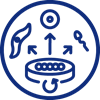Advancing reproductive medicine with stem cell innovations
Precongress Course 11
 Special Interest Group Stem Cells
Special Interest Group Stem Cells
Course coordinator
Jan-Bernd Stukenborg (Sweden)
Course type
Advanced
Course description
This advanced course examines the emerging role of stem cells in reproductive health, emphasising their impact on research and clinical practice. Across four in-depth sessions, leading researchers and clinicians will share insights into bioengineering, cell culture, disease modelling, and the regulatory landscape.
Participants will engage directly with expert speakers and ESHRE’s Young Ambassadors to discuss challenges, future developments, and clinical integration of stem cell therapies. Aimed at professionals in reproductive biology/medicine - across academia, research, and clinical settings - the course builds practice-oriented knowledge and supports the adoption of innovative stem cell strategies.
Educational needs and expected outcomes
This advanced course was developed through a structured needs assessment process that included:
1. Consultation with experts in the SIG Stem Cells
2. Review of recent literature and guidelines
3. Workforce trends and scientific advancements
From this assessment the following educational needs were identified:
• Understanding emerging methodologies
• Bridging basic science/clinical translation
• Awareness of regulatory/ethical frameworks
• Opportunities for peer exchange
Participants will:
- Critically evaluate emerging stem cell methodologies relevant to reproductive biology.
Understand the current state of clinical translation in stem cell-based reproductive therapies, including human testicular tissue and spermatogonial stem cell transplantation, and assess their clinical potential and limitations.
- Demonstrate knowledge of the regulatory, ethical, and societal challenges associated with applying stem cell technologies in reproductive medicine and develop strategies for effective science communication.
- Engage in interdisciplinary dialogue with peers, researchers, and early-career professionals to reflect on the future directions of stem cell applications.
Innovative aspects of the course
- Focus on clinically relevant stem cell applications
- Presentation of first-in-human studies
- Discussion-driven learning format
- Inclusion of ESHRE Young Ambassadors
- Exploration of ethical and societal dimensions
- International, interdisciplinary faculty
Target audience
Clinicians, basic researchers, earlier career reseachers/clinicians
Programme
Sunday 05 July 2026
09:00 - 17:00
PCC11: Advancing reproductive medicine with stem cell innovations
Sunday 05 July 2026
09:00 - 17:00: PCC11: Advancing reproductive medicine with stem cell innovations:
Francesca Gioia Klinger, Italy
Luciana Cacciottola, France
09:00 - 09:30
Modeling human blastocyst development and implantation using blastoids: implications for IVF
09:45 - 10:15
Ovarian support cell in-vitro maturation
10:30 - 11:00
Coffee break
Session 2: Stem cell methodologies on the path to clinical application
Jan-Bernd Stukenborg, Sweden
João Pedro Alves Lopes, Sweden
11:00 - 11:30
Outcomes of the first transplantation of testicular tissue in prepubertal humans
11:45 - 12:15
Initial results from human prepubertal spermatogonial stem cell transplantation
12:30 - 13:30
Lunch break
Session 3: Pluripotent stem cells as a source of germline cells
Luciana Cacciottola, France
13:30 - 14:00
In vitro models for human germline specification and maturation
Fredrick Wong, United Kingdom
14:15 - 14:45
Restoring the germline of infertile individuals with patient-specific hiPSCs
João Pedro Alves Lopes, Sweden
15:00 - 15:30
Coffee break
Session 4: Translating stem cell research: from discovery to dialogue and clinical impact
Francesca Gioia Klinger, Italy
Jan-Bernd Stukenborg, Sweden
15:30 - 16:00
Research in the modern era – how should we communicate with society?
Robin Lovell-Badge, United Kingdom
16:00 - 16:45
Panel discussion (All Speakers): From bench to bedside – when is the science ready for clinical application of stem cell-based therapies? - and ESHRE young ambassadors
16:45 - 17:00
Closing remarks
Jan-Bernd Stukenborg, Sweden